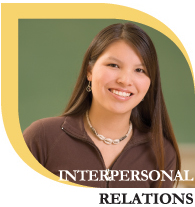Empowering Others

Empowering others means making a systematic and sustained effort to provide Indigenous people with information, knowledge, support and opportunities to be self-determined, based upon the individual or community's level of acceptance towards moving forward. An important step is acknowledging past mistakes and encouraging movement towards a positive future, at a pace and degree determined by Indigenous people. It also means taking action with employees within the public service so that they become empowered and engaged in respectful, effective Indigenous relations.
Demonstrates the Behaviour When
- Co-creates goals
- Recognizes the skills and abilities of others
- Uses language that can readily be understood by all and avoids public service specific terms and acronyms
- Encourages others to learn, act and lead based upon their own assessment of their readiness
- Creates opportunities for Indigenous people to determine their level of engagement and to determine small or big steps forward in the spirit of empowerment
- Accepts and supports perspectives, recommendations or actions of others
- Gracefully welcomes feedback on work or professional behaviour and acts upon it
- Proactively shares information and resources to enhance Indigenous empowerment
- Positions Indigenous people for success by creating a positive environment for them to contribute and lead
- Uses leadership or influence to increase empowerment of Indigenous people
- Shares or delegates authority and responsibility to others
- Removes barriers to the empowerment of others; "clears the way"
- Demonstrates trust in others by giving them room to learn and succeed and to learn from mistakes
- Publicly credits the achieved results to the relationship and to Indigenous people
- Encourages those in the public service who do not directly work with Indigenous people to learn more and take action that supports Indigenous self-determination
Needs Development When
- Criticizes or blames others
- Gives feedback while not welcoming it themselves
- Directs others rather than letting them do it on their own
- Pushes Indigenous people when they are not ready to engage at the next level or are moving at a pace that works for them
- Changes direction and does not provide background and reason for the change
- Conducts decision making independently of those impacted by the decision
- Does not understand the role of Indigenous people in creating and sustaining their own way forward
- Makes no effort to learn or use Indigenous history and cultural knowledge in a way that empowers Indigenous people
- Reduces the relationship to a document
- Shares information and resources with Indigenous people based upon one's own determination of what they need and when they need it
- Perceives one's role as doing the job for the community instead of taking on the role of facilitator
- Looks for a quick, short-term solution as opposed to sustainable outcomes
- Fails to provide adequate education or support to Indigenous people to enable them to sustain results
- Refuses to allow others to take measured risks
